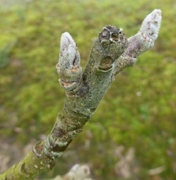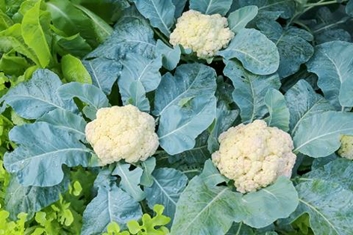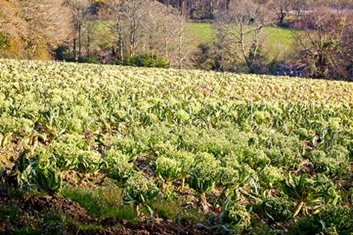

Spring is in the air, at least the weather this week suggests we are on the threshold and fruit buds moving from the dormant stage to bud swelling. Conference Pears are showing signs of swelling and some growers have started spraying their first fungicide round of the season.
In my days growing apples in Kent, this time of the year was one of hope and anticipation. One of the important factors in the development of fruit bud quality is the winter chill hours trees/fruit buds are subject to.
It is amazing how us apple growers can get so 'euphoric' about the sight of fruit buds!
Broadly speaking each variety has it's own requirement. Cox is different to Gala etc.
 If the tree does not get enough chill hours, it hasn't had enough dormancy. Without sufficient dormancy, it cannot conserve enough energy to use for fruiting. In dormancy the fruit bud builds quality which will make it more likely to set a strong apple.
If the tree does not get enough chill hours, it hasn't had enough dormancy. Without sufficient dormancy, it cannot conserve enough energy to use for fruiting. In dormancy the fruit bud builds quality which will make it more likely to set a strong apple.
Remember, fruiting takes a lot of energy! We all perform better after a good sleep!
This winter accumulated chill hours (0C - + 7C) are adequate and slightly higher than any of the last five years.
The weather has taken a pleasant turn for the better this week, so hopefully it's 'onwards and upwards'

![]()
As the year moves on and speculation/anticipation is on my mind, a recent study by British Apples & Pears Ltd is worth consideration!
A new analysis of costs facing British apple and pear growers indicates that food price rises - inflation - in 2025 are now an inevitable consequence of recent government policy.
Put simply, new analysis has revealed that the latest budget announcements regarding the national living wage and national insurance will increase food prices in 2025. This will increase food price inflation, and it is likely that we will not see the forecast growth in general economy.
In November 2024, British Apples & Pears Limited (BAPL), the grower organisation, commissioned Andersons Farm Consulting to investigate the cost of production impact of the recent budget announcements. The analysis estimates that 2025 will see a 7p increase in the median cost of producing a kilogram of apples (from £1.33 to £1.40).
"Growers margins have been stripped to the bone, so these increases in the cost of producing British apples and pears will have to be passed on to retailers, who have already said they will have to pass on wage rises to consumers." Explained Ali Capper, executive chair of BAPL.
"Shoppers will end up paying more for their fresh apples and pears. Food price inflation is a direct consequence of government policy. Labour costs are about half of the total costs of producing British apples and pears, and growers are facing a 10% increase in that cost alone from the national living wage and employer national insurance increases.
"These changes will impact growers, retailers, shoppers and could even tip the country into recession as consumer demand declines in the face of price rises. On top of that growers are now facing the costs associated with the newly proposed changes to inheritance tax. The costs associated with tax planning will also have to be priced in for the future."
To mitigate some of the major negative impacts of these 2025 changes, BAPL is calling for the following:
For retailers to:
Treat suppliers fairly, recognising the levels of inflation growers face
Invest in British fresh produce and long-term relationships with UK suppliers
For government to:
Expedite their policy work on fairness in the supply chain
Reverse the IHT proposals
Provide five-year certainty on the seasonal worker scheme, so that growers can plan for the future
The need for fairness in the retail world was emphasised this week with news of imported Cauliflowers on sale in UK Supermarkest while UK Cauliflowers were being left in the fields!
![]() DISGUSTING
DISGUSTING
Below
Growers say supermarkets are prioritising imports over British production
Thank you to Michael Barker Editor Fresh Produce Journal and Jack Ward from British Growers for extracts from their coverage of the Cauliflower debacle.
FPJ has spoken to a number of leading suppliers of the crop, who have all confirmed that supermarkets are shunning British product and instead buying in winter cauliflower from Spain and France. As a result, a considerable volume of British cauliflower has been left to waste in fields, and growers have been left questioning the future viability of the line.
The issue also raises serious question marks over supermarkets' publicly stated commitments to support British farmers, as well as their high-profile attempts to reduce both food miles and food waste.
Growers report hundreds of acres of cauliflower being chopped up in Cornwall alone, in scenes that make for very uncomfortable viewing at a time when the government is talking up Britain's need for food security.
Below: left. beautiful British Cauliflower and right. British Cauliflower going to waste!


According to Jack Ward of British Growers, the organisation is considering a formal appeal to supermarkets. "We've got into a crazy situation where we are ploughing in cauliflowers in Cornwall while trucking them up from Spain," he stated. Ward continued, "It does not suggest that retail and supply is working hand in glove to make the best of the situation, and that is surely wrong. We are wasting good, wholesome, nutritious food and then spending a fortune bringing it in from the other side of Europe. It is radically wrong, and something needs to change."
![]() That is all for this week, sorry this Journal is late published 'on line'
That is all for this week, sorry this Journal is late published 'on line'
Take care
The English Apple Man